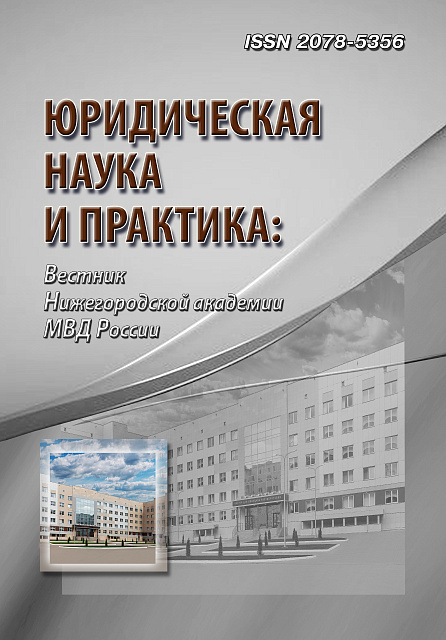Sankt-Peterburg, St. Petersburg, Russian Federation
Based on the understanding of a number of judgments from Russian legal publications, conclusions useful for the theory and practice of lawmaking are formulated. In particular, firstly, it is incorrect to imagine that the essence of law-making is the “search for law”. After all, there is no law before law-making Secondly, the following conclusion is erroneous. “The digitalization of public relations leads to the fact that all processes in society, including the legal sphere, are accelerated many times. There are more and more new groups of relationships, including those developing in the virtual space, which are not regulated by law. As a result, lawmaking is increasingly lagging behind the pace of development of public relations. While law-making bodies pay attention to the emergence of a new group of public relations, make efforts to develop, discuss and adopt a normative legal act, the relations that develop under the influence of digitalization will change again. In these conditions, the processes of digitalization lead to the fact that law-making becomes irreversibly catching up. Many of the adopted regulations become outdated already at the moment when they come into force”. The argument in favor of the fallacy of the above conclusion is obvious. If “all processes in society, including the legal sphere, are repeatedly accelerated”, then there can be no question that “law-making is increasingly lagging behind the pace of development of public relations”, and it is absurd to declare “that law-making is becoming irreversibly catching up”. Thirdly, the following consequences of digitalization highlighted in the legal literature are missing and are not expected. “There is a tendency to reduce the role of legal acts in regulating public relations, to the possible emergence of new, as yet unknown regulatory systems, including, possibly, quasi-legal regulators. Such a trend may lead to the loss of its role by legal acts, which will also affect law-making activities”. The reason for the current absence and improbability of such consequences is simple. There are no and never will be conditions, namely the lag of law-making “from the pace of development of public relations” and the “catching up nature” of law-making activities, which cause mentioned consequences.
law, lawmaking, formal source of law, culture of lawmaking, creation of law, establishment of law, digitalization of public relations, catching up nature of lawmaking
1. Rumyantsev M. B. The concept, types and signs of lawmaking. State and law, 2017, no. 4, pp. 98–101. (In Russ.)
2. Sapun V. A., Turbova Ya. V. Lawmaking and lawmaking: strategy and tactics of the formation of law and the law. Legal technique, 2015, no. 9, pp. 679–682. (In Russ.)
3. Amelin R. V. Use of state information systems as forms (sources) of law: prospects and problems. Bulletin of Moscow University, 2021, no. 4, pp. 3–15. (In Russ.)
4. Afanasyev V. S. Law education and lawmaking. Legal science and law enforcement practice, 2008, no. 1 (4), pp. 4–14. (In Russ.)
5. Komarov S. A., Malco A. V. Theory of State and Law: Textbook. Recommended by the Council for Legal Studies of the UMO of Universities of the Russian Federation. Moscow: “Infra-M” Publ., 2003. 480 p. (In Russ.)
6. Kerimov D. A. Culture and technology of lawmaking. Moscow: Yurid. lit. Publ., 1991. 160 p. (In Russ.)
7. Zaloilo M. V. Post-industrial culture of law-making: a new image of reality. Bulletin of the O. E. Kutafin University (MGUA), 2022, no. 4, pp. 65–72. (In Russ.)
8. Pashentsev D. A., Zaloilo M. V. The impact of modern digital technologies on the content and nature of law-making activities: theoretical and legal aspect. Legal science and practice. Bulletin of the Nizhny Novgorod Academy of the Ministry of Internal Affairs of Russia, 2018, no. 4 (44), pp. 231–235. (In Russ.)
9. Pashentsev D. A. On the issue of the influence of digital technologies on law-making and law enforcement (formulation of the problem). Russian State Studies, 2018, no. 4, pp. 131–137. (In Russ.)
10. Yagofarova I. D. Digital technologies in law-making activity: theoretical and legal aspect. Journal of Law, 2021, no. 2, pp. 4–10. (In Russ.)
11. Arnautova A. A. Digitalization of law-making activity. Century of quality, 2019, no. 2, pp. 32–42. (In Russ.)
12. Karpets D. V. The influence of digital technologies on the law–making activity of the state / The second International Theoretical and Legal readings named after Professor N. A. Pyanov: Conference proceedings, November 6 and 14, 2020 / ed. and comp. M. Y. Spirin; [by ed. S. Y. Sumenkov, I. A. Kuzmin]. Irkutsk: Interregional Association of Theorists of State and Law, 2021. 500 p. (In Russ.)
13. Khabrieva T. Ya. Law before the challenges of digital reality. Journal of Russian Law, 2018, no. 9, pp. 5–16. (In Russ.)












